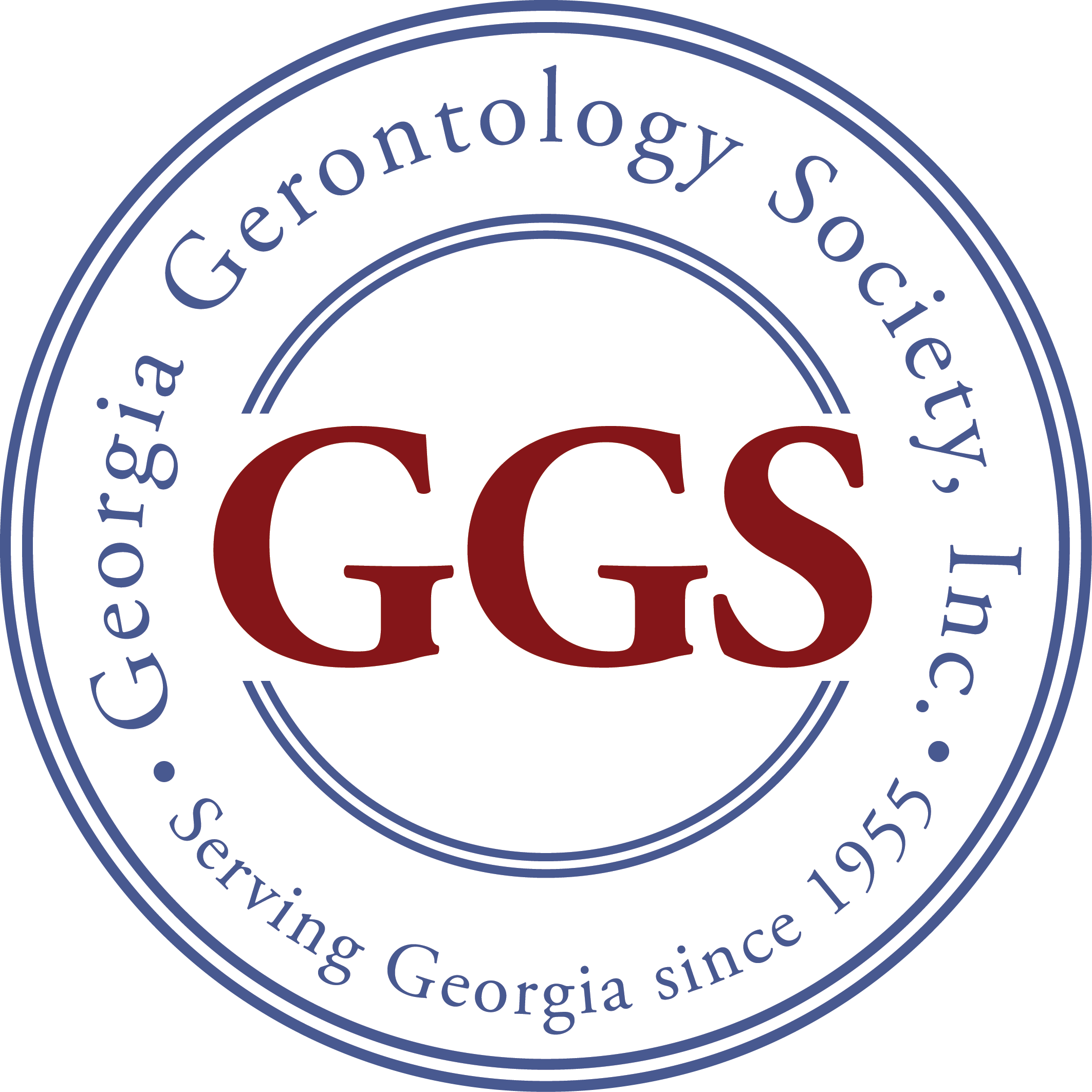GGS 2019 ANNUAL CONFERENCE
Connect. Explore. Grow.
The Ritz-Carlton Reynolds
Lake Oconee
July 22-24, 2019
Our theme for the 64th Annual Conference was Connect. Explore. Grow. Over three days of dynamic general sessions, engaging educational workshops, and networking opportunities, GGS provided attendees with the tools to:
- CONNECT with colleagues to develop new collaborations and break down silos,
- EXPLORE innovative and best practices across the aging network, and
- GROW to become better providers, leaders, and advocates for older adults.
Conference Program
Thank You to our Sponsors!
Gold Sponsor – AARP
Silver Sponsor – Mercer University College of Health Professions
Silver Sponsor – Office of the Long Term Care Ombudsman
Conference Bag Sponsor: Law Offices of Dennise L. Grayson, LLC

Keynote Speaker Sponsor: Culture Change Network of Georgia

Conference Presentations
Best Practices to Meet and Promote Health Literacy with Your Clients: A Refresher/Primer to Better Meet Older Adult Health and Well-Being Needs
Dr. Kay Graham, Brenau University
Lisa Howard, Legacy Link Area Agency on Aging
The presenters will discuss health literacy concepts, older adults as a vulnerable population, and recent research regarding gerontology practitioners’ current knowledge and practices regarding health literacy. Participants will practice health literacy concepts and then brainstorm strategies to meet and promote health literacy in their practice settings.
Co-Occurring Conditions in Older Adults, Mental Health, Medical, Addiction, and Treatment Solutions
Sharon A. Matthew & Dr. Ming Wang, Canon Treatment Centers
This presentation will cover mental health issues in older adults including prevalence of depression and anxiety in older adults and the growing need for addiction therapy for older adults. This presentation will also highlight the medical complications for older adults and the difficulty in assessing them as well as effective treatment for older adults with mental health, addiction, and medical issues.
Dementia Live – Evoking Change through Empowering Experiences
Laura Ellen Christian & Susan Robbins, The Arbor Company
Ann Germany, The Solana East Cobb
In this high-impact experience, you will be immersed into life with dementia, resulting in a deeper understanding of what it’s like to live with cognitive impairment and sensory change. You will be empowered to build new bridges of communication for those living with dementia as well as have a deeper understanding of how exposing others to this experience can spread culture change within a community.
Grantwriting for the Aging Network
Dr. Jennifer Craft Morgan, Georgia State University, Gerontology Institute
This workshop will provide an overview of the practical aspects of planning for and writing a grant to support aging services programs or interventions. Dr. Morgan has more than 15 years’ experience writing, implementing, and evaluating grant-funded projects aimed at improving training, job quality, and quality of care for older adults across healthcare settings. Dr. Morgan will share practical tips on how to get started and tips for those already in the process of grant writing. Come ready to participate in this interactive session.
Identifying and Addressing Malnutrition in Older Adults: A Social Model Approach
Allison Bernal & Renae Brown, GA DHS Division of Aging Services
Can you spot malnutrition in older adults? Would you know what to do about it? In this session, learn how to identify malnutrition and ways to address this growing problem at the individual, interpersonal, policy, community, and organizational levels. Learn about a theory-based framework for understanding the effects of personal and environmental factors that determine health behaviors.
Increasing Access to Naloxone Saves Lives
Michael Crooks, Alliant Quality
Older adults face additional risks of opioid-related harm, but those who receive the opioid-reversal drug naloxone are 50% less likely to die than those who didn’t. Learn opioid risk screening strategies and tips for recommending safe opioid practices to older adults including naloxone co-prescribing when appropriate.
Pain Medicine Dos and Dont’s – this is a plain-language tip sheet to reinforce counseling on safe opioid use and storage
Naloxone Patient Flyer – this is one of the better naloxone brochures to review available naloxone options, use and risks for opioid overdose
Lets Talk About Naloxone – great communication tips for discussing opioid issues to avoid stigma/bias that can be perceived by patients/family members
Naloxone Tip Sheet – general info on the naloxone State Standing Order and some tips for pharmacies to improve naloxone dispensing.
www.alliantquality.org/
Intimate Connection & Sexuality in the Context of Dementia Disorders: Benefits, Risks, and the Role Own Values Play
Dr. Regina Koepp, Atlanta VA Medical Center & Emory University School of Medicine Department of Psychiatry & Behavioral Sciences
People with dementia disorders experience a decline in functioning, but often maintain a need for intimate connection. This workshop will discuss sexuality, intimacy, and dementia disorders. It will review risks and benefits of intimacy, complicating factors, and the role values play when determining appropriateness of intimate connections.
Handout – Resident Sexual Expression Policy from the Hebrew Home at Riverdale in NY
Handout – Sexuality and Dementia Article & Values scale by Daniel Kuhn, MSW
Older Adult Mobility: Assessment, Planning, and Program Perspectives on Transportation in Georgia
Kristi Fuller & Alice Prendergast, Georgia Health Policy Center
JD Dillard, Southern GA Regional Commission
Jami Harper, SOWEGA Council on Aging
Mobility plays a critical role in the maintenance of quality of life among older adults. This presentation will highlight findings from a statewide assessment focused on transportation; describe current practices in transportation planning; and explore innovative approaches to addressing unmet transportation need for older adults.
Presenting with Impact
Clark Brown, OnTrack International, Ltd.
Does presenting to an audience make you feel anxious and uncomfortable? Do you ‘survive’ the experience? Are you unsure if you have really got the message across? If you answered ‘Yes’ then this session is ideal for you. Learn how to manage your nerves, appear more confident and make sure you get your message across. This session is highly practical, interactive, and full of top tips to help you develop the number one skill of presenting to an audience.
Raising Your Voice for Public Policy Advocacy: Taking Action Together
Melanie McNeil, GA DHS, Office of the State Long-Term Care Ombudsman
Katie Perumbeti, Atlanta Regional Commission
Does your organization engage those you serve to amplify their voices through advocacy? It is important to learn how to set your advocates in motion by encouraging consumers, providers, and professionals to become civically engaged. This presentation will include general principals of policy advocacy,including how the process works and an example using the Georgia General Assembly.
Reducing Hospital Readmission in the Population with Alzheimer’s Disease and Related Dementia
Katherine Vanderhorst, C&V Senior Care Specialists, Inc.
People living with Alzheimer’s are hospitalized 2-3 times more than people without Alzheimer’s. One in four are likely to be readmitted within 30 days from discharge. The person with Alzheimer’s and Related Dementias and their caregivers struggle to manage the comorbidities that often lead to hospitalization.
Safety and Independence in the Home through Home Modification
Dennis Lippy, HomeFree Home Modification
This presentation will depict an overview of home modification of how (1) clientele is identified & who is best served by home adaptation, (2) how the CAPS (Certified Aging in Place Specialist) designation plays a major role in the professional experience provided, (3) the numerous types of home modification, both interior & exterior, that can be provided to allow the resident to have a more “user friendly” home, and (4) the broad view of the funding to pay for home modification.
Smiles for Miles: You Don’t Have to be Down in the Mouth!
Pam Cushenan, Soft Smiles, LLC; Georgia State University
Sonya Dunbar, Geriatric Tooth Fairy
Oral health care needs rank as one of the highest concerns for older adults and their families. Learn all about Georgia’s new law that increases access to oral care, highlights educational workshops for carers, and options for mobile oral care that brings preventive services within reach to older adults.
Still Going Strong in Georgia: Advocacy for Older Adult Transportation
Vicki Johnson, Kathy Floyd, & Maureen Kelly, Georgia Council on Aging
Scott Haggard, ATL Transit Authority/ State Road and Tollway Authority
Access to transportation is identified as one of the highest unmet needs for older Georgians. This panel discussion will explore current efforts underway to seek solutions for better transportation options and also focus on advocacy work about the issue.
“SUPERHERO” – Rethinking Your Approach
Mary Jo Johnson, Aging Concept, LLC and Wellbridge Community of Madison
Come explore the meaning of preserving personhood. You will be moved to contemplate the human soul like possibly never before. Mary Jo presents an eye-opening session on the realization of providing memory care from the “heart” and not always from the “head.” Learn ways to reexamine traditional practices and adopt greater relational practices. Develop strategies for facilitating smooth transitions and creating individualized approaches fostering a “true” person-centered culture.
Turning the Intangible into Measurable Data
PK Beville, Second Wind Dreams
Georgia is the first state to implement the Virtual Dementia Tour Comprehensive Program. It is currently being provided to 171 nursing homes in GA through a CMP project grant. The results of this program show that there is an increase in staff person-centered care along with clear statements of competency. Design initiatives will be covered along with specific strategies that can be applied in all settings. With the new CMS guidelines on our doorstep, this program will help prepare participants especially for Quality Assurance and Performance Improvement (QAPI).
Using Motivational Interviewing to Address Risky Alcohol Use in Older Adults
Michelle Dattada & Woodrina Layton, Alliant Quality
Risky alcohol use in older adults impacts medication effectiveness, responsiveness to medical treatment, patient safety, and independence. Addressing risky alcohol use in older adults can be met with resistance and denial. Motivational Interviewing offers an effective opportunity to engage patients and achieve health goals.



